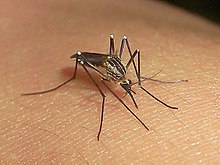Parasitism
![]()
Parasite and parasite are redirects to this article. For the meaning of the terms in the interpersonal sphere, see social parasite.
Parasitism (also called parasitism) refers to the phenomenon within the animal and plant world that an organism or virus (parasite) abuses a usually considerably larger organism of another species as a host. The host serves as the parasite's food supply (usually in the form of blood or other bodily secretions) and in some cases also as a long-term habitat. In the process, the host is damaged by the parasite, but usually remains alive. The consequences of parasitic infestation range from massive physical discomfort to severe infectious diseases and, in extreme cases, death, in addition to the sting or bite injury. The best-known and most widespread parasites of humans are, among others, human lice, mosquitoes and various species of ticks and worms.
Parasites whose parasitism usually leads to death are called parasitoids or predatory parasites, for example ichneumon flies. Parasitism is a form of interspecific interaction. If, on the other hand, no harm is done to the host, this is called probiosis, for example in commensalism.
In a broader sense, parasitism can be understood as an increase in the fitness of the parasite, sometimes associated with a decrease in the fitness of the host.

Ectoparasite (mosquito) on the skin of a human being
Word History
Parasite is etymologically derived from ancient Greek παράσιτος parásitos, German 'eating from another, parasite', which goes back to ancient Greek παρά pará, German 'next to' as well as ancient Greek σῖτος sītos, German 'grain, food [made from grain]'. Hereby was originally meant the taster at sacrificial feasts, who thereby came to be fed without performance. From there the meaning passed to the lickspittles of ancient comedy, who sought to procure free meals by fine words. A switch to a biological meaning in the sense of a living thing that lives in or on others (see ectoparasites and endoparasites) and extracts nutrients from them occurred in the 18th century. From there, the meaning soon returned to the social field, for example in Enlightenment polemics against the nobility or in the anti-Semitic stereotype of the Jewish parasite.
The German word Schmarotzer for a parasite comes from the Middle High German smorotzer, meaning beggar.
Description
Parasites are highly specialized organisms. Their habitat is usually restricted to a few host species, and it is not uncommon to find only one host species. Parasitism manifests itself in very diverse forms. There are doubtful cases where parasitism is difficult to distinguish from other interactions between species. Parasitism is by no means a rare phenomenon, as the vast majority of all living things parasitize. With the caveat that exact numbers cannot be determined, the ratio is thought to be as high as 4:1. The appearance of the next generation in the host is called sponsorship.
In general, a parasite is highly dependent on its host. Parasitism can be related to various host factors such as body substance, food supply, oxygen demand, osmotic, pH conditions or heat balance.
Parasitism is ubiquitous, so virtually all living things have to deal with it. It is not uncommon to find dozens of different parasites on or in a single creature, not counting microorganisms. In wood mice, no fewer than 47 parasitic species were found.
Depending on the extent of the parasite infestation, the burden on the host varies. Even if parasite infestation does not cause life-threatening damage to the host, it always has a negative effect on its growth, well-being, susceptibility to infection, reproduction or lifespan. Thus, toxic metabolic products of the parasite, internal or external injuries left behind or deprivation of food can result in a shortening of life, especially in the case of further unfavourable environmental conditions. Hosts, however, are by no means passive towards their parasites, but are usually able to limit the number and damaging effect by suitable defence mechanisms. In a joint evolution (co-evolution), hosts and their parasites adapted to each other. Thus, at each stage of evolution, a balance developed in which the parasite benefits without harming the host, which is its "basis of existence", more than necessary or even destroying it completely (the same mechanism exists in infectious diseases between pathogen and host with regard to virulence, disease progression and immune defence).
Many parasites parasitize in different hosts during their development. A distinction is made between intermediate hosts and the final host. Sexual reproduction usually only takes place in the final host.
Organisms that are attacked without the continuation of the parasite's development cycle being possible are referred to as the false host. Often, the parasite is poorly adapted to its maladaptive host, so that the maladaptive host is more damaged by the parasite than the host.

Flea bites in humans
Questions and Answers
Q: What is parasitism?
A: Parasitism is a form of symbiosis where one organism (the parasite) lives off of another organism (the host).
Q: Do all parasites harm their hosts?
A: Not necessarily. Some parasites may harm the host, while others may not.
Q: What are parasitoids?
A: Parasitoids are organisms that live off of and usually kill their hosts.
Q: How does parasitism differ from mutualism?
A: Parasitism is the opposite of mutualism, where both organisms benefit from the relationship.
Q: What are some examples of parasites in humans?
A: Some examples of parasites in humans include tapeworms and leeches.
Q: What is the most serious cause of human death by a parasite worldwide?
A: Malaria is the most serious cause of human death by a parasite worldwide.
Q: Can parasitic relationships be one-sided?
A: Yes, parasitic relationships are generally one-sided, with the parasite benefiting while the host is harmed or has no benefit.
Search within the encyclopedia